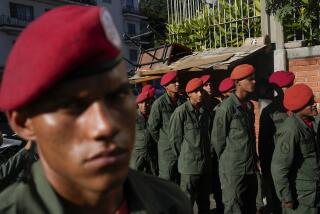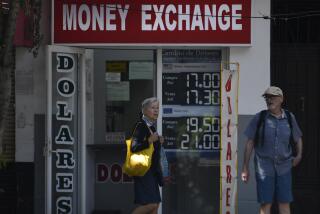Venezuelans throng stores after currency devaluation
- Share via
Reporting from Bogota, Colombia, and Caracas, Venezuela -- Nurse Luisa Perez Garcia thought there was no time to lose.
So, first thing Monday morning, she rushed down to the Electropolis appliance store in the Sabana Grande section of Caracas and bought a new TV and refrigerator, purchases she had hoped to defer until later this year.
Garcia was among the thousands of Venezuelans flocking to stores to snap up appliances, auto parts, electronics and other imports before they feel the full impact of President Hugo Chavez’s decision last week to officially adjust the nation’s currency for the first time since 2005.
Chavez cut the exchange rate of the bolivar against the dollar by half. At the same time, he warned merchants during his weekly TV address on Sunday that raising prices too much could result in the seizure of their businesses. On Monday, he declared 24-hour closures of two big retailers, Exito and Makro, for alleged “irregularities.”
“The devaluation forced me to get over here before prices multiplied or supplies just vanished,” Garcia, 62, said Monday. “I couldn’t get the brands I wanted -- everything’s almost gone. But that doesn’t matter. I’m trying to protect myself.”
Many Venezuelan consumers said they fear Friday’s announcement is a harbinger of additional price hikes and inflation. Last year, the nation’s inflation rate reached 25%, Latin America’s highest.
Beginning Saturday, stores and shopping malls in Caracas, the capital, were the scene of massive lines and mad rushes through the aisles. Monday was the first full day of business since the announcement of the devaluation, to 4.3 bolivars to the dollar from 2.15. The move will essentially double the cost of about two thirds of all imports, as well as the price of foreign travel.
Certain imports, such as medicines, will be subject to a less punitive rate.
Venezuela has long had a thriving black market in dollars, where the exchange rate has been between 6 and 7 bolivars to the dollar.
Chavez said the measures would boost the competitiveness of the country’s exports while discouraging Venezuelans from buying all but “strictly necessary” imports. A strong bolivar in recent years has fueled a consumption binge and stoked inflation. Domestic industry has lagged and imports, even of basic food items, have soared.
Several shoppers interviewed Monday, including taxi driver Pedro Altuve, who spent his last $600 on new tires, expect things to get worse.
“The devaluation took me by surprise,” said Altuve, 43. “I have other pressing expenses, but in the next few months for sure these tires will cost two or three times what I paid, money I won’t have.”
The lack of confidence among Venezuelans contrasted with the positive response the devaluation got from Wall Street. Venezuelan bond prices rose and the Standard & Poor’s debt-rating agency upgraded its outlook on Venezuela’s creditworthiness, saying the country will now be better able to balance its budget and pay down its $58 billion in foreign and domestic debt.
“The devaluation gives them, in essence, one more measure with which the government can reduce fiscal pressure,” said S&P analyst Roberto Sifon-Arevalo. But he warned that the devaluation could cause an increase in inflation this year to as high as 40%. He said “it makes sense” that Venezuelans are nervous about the future.
During his 11 years in office, Chavez has redistributed much of the nation’s oil wealth to the poor. But he has also presided over scarcities of food and household goods, partly because price controls were set so low that businesses could not produce them at a profit.
In recent months, Venezuela has been beset by power and water outages, which Chavez blames on a drought that has crippled the country’s extensive hydroelectric system. He has acknowledged that the Guri dam system in eastern Venezuela is in danger of collapse if reservoir levels continue to drop.
The president has announced rationing to reduce power demands by 20% for the rest of the year, and ordered that government offices close at 1 p.m. on weekdays and that electricity exports to Brazil be cut 70%.
Critics say Chavez has squandered the nation’s oil wealth and that the power crisis stems from his neglect of infrastructure at the expense of foreign giveaways to build support for his anti-U.S. policies. They cite the ongoing military buildup and the nationalization of some businesses.
Last month, Chavez nationalized seven banks and an insurance company, accusing their owners of fraud and mismanagement.
Combined with spiraling crime and housing shortages in Caracas and other cities, the shaky economy has cost Chavez popularity even as key elections are due this year. Opposition candidates are expected to make significant gains.
Mogollon and Kraul are special correspondents.
More to Read
Sign up for Essential California
The most important California stories and recommendations in your inbox every morning.
You may occasionally receive promotional content from the Los Angeles Times.













